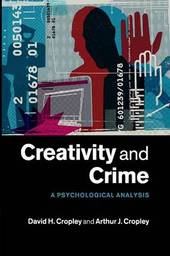
|
Creativity and Crime: A Psychological Analysis
Paperback / softback
Main Details
| Title |
Creativity and Crime: A Psychological Analysis
|
| Authors and Contributors |
By (author) David H. Cropley
|
|
By (author) Arthur J. Cropley
|
| Physical Properties |
| Format:Paperback / softback | | Pages:260 | | Dimensions(mm): Height 230,Width 150 |
|
| ISBN/Barcode |
9781107562516
|
| Classifications | Dewey:364.019 |
|---|
| Audience | | Professional & Vocational | |
|---|
| Illustrations |
14 Tables, black and white; 3 Line drawings, unspecified
|
|
Publishing Details |
| Publisher |
Cambridge University Press
|
| Imprint |
Cambridge University Press
|
| Publication Date |
1 October 2015 |
| Publication Country |
United Kingdom
|
Description
Creativity is typically perceived to be a positive, constructive attribute and yet, highly effective, novel crimes are committed which illustrate that creativity can also be utilised to serve a darker and more destructive end. But how can these 'creative criminals' be stopped? Adopting a psychological approach, renowned subject experts Cropley and Cropley draw upon concepts such as 'Person,' 'Process', 'Press' and 'Product' to explain how existing psychological theories of creativity can be applied to a more subtle subset of ingenuity; that is to say criminal behaviour and its consequences. Creativity and Crime does not look at felony involving impulsive, reflexive or merely deviant behaviour, but rather the novel and resourceful measures employed by criminals to more effectively achieve their lawbreaking goals. The book transcends the link between crime and creativity, and proposes a range of preventative measures for law enforcers. Scholars and graduates alike will find this an invaluable and illuminating read.
Author Biography
Arthur Cropley obtained his PhD from the University of Alberta (Canada) in 1965 and taught at the Universities of Regina (Canada) and Hamburg (Germany), with brief stints in Australia. He has also lectured in Belgium, Bulgaria, Egypt, France, Latvia, Switzerland, Turkey, the United Kingdom and the USA. After becoming Professor Emeritus on April 1, 1999, he was Adjunct Professor of Engineering at the University of South Australia for six years and also became visiting professor at the University of Latvia. He was founding editor of High Ability Studies and is on the board of the Creativity Research Journal. He has received awards and fellowships, and an honorary doctorate from the University of Latvia. In 2004, he received the Order of the Three Stars from the President of Latvia. He has published extensively on creativity and is the author of 25 books, with translations into a dozen languages including Hungarian, Latvian, Chinese and Korean. He has become increasingly interested in recent years in using creativity concepts to examine areas not usually associated with creativity (such as engineering) and has looked closely at the dark side of creativity, and particularly crime. David Cropley is a former officer in the United Kingdom's Royal Navy. He has been a member of staff at the University of South Australia since 1990, teaching across a range of topics in electronic and systems engineering. From 2003 to 2007 he was Director of the University's Systems Engineering and Evaluation Centre (SEEC). Since 2006 he has been very active in developing masters degrees in systems engineering with a particular focus on flexible delivery and has built up considerable experience in the application of tools such as virtual classrooms to the delivery of postgraduate education. Together with Arthur Cropley he has published Fostering Creativity: A Diagnostic Approach for Higher Education and Organisations (2009) and in conjunction with Cropley, James Kaufman and Mark Runco was co-editor of The Dark Side of Creativity (Cambridge, 2010).
Reviews'The value of creativity is now recognized in numerous domains, fields of study, and professions. No wonder this broadening of interests and applications has led to the question of a relationship between creativity and crime. This volume explores that relationship in an objective, cogent, and readable manner. It accomplishes the difficult feat of sticking with the research and yet keeping the discussion broadly accessible. This volume therefore represents a huge step forward towards an understanding of the various ways in which crime and creativity might be related to one another.' Mark Runco, Editor, Creativity Research Journal 'The study of the intersection of crime and creativity has needed a fresh approach for some time, and David and Arthur Cropley have filled this need in fine style. Their comprehensive analysis has a strong theoretical grounding and interdisciplinary perspective that set this book apart. This volume will be the standard treatment of this topic for years to come.' Jonathan Plucker, Indiana University 'To keep crime and terrorism under control in the medium-to-long term, crime preventers (whether in the police, local or national government or the design and manufacturer of products, systems and services) need the capacity to out-innovate adaptive offenders, and those lesser offenders who draw on the formers' tools and tactics. This means acquiring a thorough understanding and anticipation of criminal creativity, and a strong element of creativity themselves in designing solutions; and establishing a level of organisational support and legal infrastructure that makes the controlled exercise of that creativity feasible and socially acceptable. The well-researched and thought-through framework developed by David and Arthur Cropley and engagingly presented in this book, shows the way ahead. Professional preventers of crime and terrorism should now give these ideas a serious try.' Paul Ekblom, University of the Arts, London '... this book is highly recommended. The authors take a very complicated and often counter-intuitive intersection of two distinct topics and guide the reader along a thought-provoking, informative, and fun discourse. Many readers will find that they are re-thinking their fundamental assumptions about crime and law enforcement.' James C. Kaufman and Cuiping Tu, Criminal Law and Criminal Justice Books (www.clcjbooks.rutgers.edu)
|